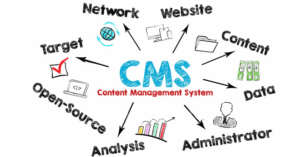We offer diverse software options to boost effectiveness and achieve better results!
We offer diverse software options to boost effectiveness and achieve better results!

In today’s digital landscape, businesses, bloggers, and eCommerce store owners need an efficient way to manage, create, and organize digital content. This is where a Content Management System (CMS) software becomes invaluable. A CMS allows users to build and manage websites without needing to code manually, making it a game-changer for both beginners and professionals.
Whether you’re running a blog, a company website, or an eCommerce CMS software, choosing the right platform can significantly impact your success. This guide will explore CMS software in-depth, covering its types, target users, essential features, pricing structures, and expert tips for choosing a content management system that fits your needs.
A Content Management System (CMS) software is a digital platform that enables users to create, modify, and publish content on a website without requiring advanced technical skills. It provides a user-friendly dashboard, pre-built templates, and various plugins to streamline website management.
A CMS eliminates the need for complex coding, allowing businesses and individuals to focus on content creation, marketing, and user engagement. Whether it’s a blog, portfolio site, corporate website, or an online store, a CMS ensures a seamless experience for content management.
CMS platforms come in various forms, each catering to different needs. Here are the most common types:
This type includes platforms like WordPress, Joomla, and Drupal, where content and design are closely integrated. These CMS solutions are great for small businesses, bloggers, and companies that need a simple, flexible content management system.
A headless CMS separates content management from content delivery, giving developers more control over how content appears across different platforms, including websites, apps, and IoT devices. Examples include Contentful and Strapi.
Businesses with unique requirements may opt for custom CMS software, designed specifically for their needs. This option offers greater flexibility and security but requires significant development resources.
For businesses selling products online, an eCommerce CMS software like Shopify, Magento, or WooCommerce is ideal. These platforms integrate inventory management, payment processing, and SEO optimization features.
A CMS is widely used by various industries and individuals, including:
When choosing a content management system, certain features are essential for functionality, ease of use, and performance. Here are some must-have features:
A CMS should have an intuitive dashboard that allows non-technical users to create and manage content effortlessly.
A strong CMS should include built-in SEO tools such as:
Security is critical in a CMS, and features like role-based access control, regular security updates, and SSL encryption help protect websites from cyber threats.
A CMS should allow multiple users with different permission levels to collaborate on content creation and approvals.
For businesses running online stores, a CMS should support:
Here are some of the top CMS platforms available today:
CMS software comes in different pricing models, depending on features and scalability.
Platforms like WordPress, Joomla, and Drupal offer free core versions, but users must pay for hosting, themes, and plugins.
With so many options available, selecting the right CMS can be challenging. Here are some tips to help:
Selecting the best Content Management System software is crucial because it directly impacts your website’s performance, security, and SEO. The right CMS will:
A Content Management System (CMS) software is essential for managing digital content efficiently. Whether you’re looking for custom CMS software, eCommerce CMS software, or simply exploring a content management system sample, choosing the right platform is critical for success.
With the right CMS, you can build a professional website, streamline content creation, and scale your business effortlessly. Now that you have a complete understanding, it’s time to explore the options and find the best CMS that meets your needs!
Let us assist you in narrowing down the ideal tools tailored to your budget and business requirements. Simply complete the form, and we’ll reach out to you soon!